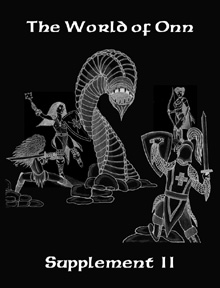The Bard (Fighting-man Subclass)
Hit Dice Type:
|
d6.
|
Armor/Shield Permitted:
|
Light armor; Light and Medium shields.
|
Weapons Permitted:
|
Any 1-handed melee weapon; Light Crossbow, Dart,
Firearm (Pistol),
Short Bow, Sling.
|
Prime Attribute
|
Strength and Charisma.
|
Starting Gold:
|
3d6x10gp.
|
Bards are
collectors of lore and knowledge, travelling minstrels who hire for
entertainment for their supper, explorers of far off lands and more. Bards
travel far and wide, carrying with them the knowledge they glean from the
places they visit and spread word of events great and small from town to town.
Most of the tales a Bard shares with the populace at large is of the common
variety, stories of great battles, or a masterful hunt by some petty lord,
gossip of the court ladies and the like. Adventurers however, can learn some
interesting facts about creatures, lore of a local dungeon or rumors of
adventures to be had in nearby towns. On occasion, a Bard will offer to
accompany, or allow himself to be hired to a band of adventures in order to
create a new tale and gain more knowledge he can use.
The Bard is
generally a charismatic individual and must possess at least a 10 Strength and
12 Dexterity and Charisma. As Bards progress in experience, they gain several
abilities and are able to produce magical effects through their music, song and
tales.
Bard Class Abilities
Bard’s Ear (1st level): Bards are attuned to sounds and noises and the tuning/playing of
musical instruments. Whenever a Bard is the subject of discerning noises or
performing, they gain a +2 bonus to any die rolls.
Disarming Charm (1st level): Bards are personable and gain a +2 bonus to any die rolls involving
influencing the reactions of others.
Fighting-man Combat Options (1st Level): Bards have one combat option at 1st level, gaining another at 5th level
and every 5 levels thereafter. See the Fighting-man Class for details.
Haphazard Lore (1st level): The Bard is a repository of various tidbits of knowledge and lore from
his wanderer lifestyle and can attempt to glean information from examining an
item, creature, object or writing. The Bard generally has a +1 bonus to any die
rolls to glean information. At 4th level and greater this becomes a +2 bonus
and at 9th level and greater he possesses a +3 bonus.
Heroic Performance (1st level): Bards have the ability to cause almost magical-like effects through the
use of music, song, recitation, dance, brazenly combating foes with panache and
the like that affect allies or enemies (depending on the effect generated).
Heroic Performance can be used 3 times per day, plus the Bard’s Charisma
adjustment. Unless noted otherwise effects last until the Bard ceases
performing (maximum of 1 round per level, plus the Bard’s Charisma adjustment).
·
Captivate: The Bard can capture and hold the attention of 1d6
enemies plus his Charisma adjustment in a 30 ft radius, beginning with the
closest to the farthest. If the monsters fail Ego saving throws they cease
attacking but will still defend themselves until the effect ends.
·
Countersong: The Bard can suppress the effects of other
creatures’ sound-based mind effects, such as a harpy’s charm, in a 30
ft radius around himself. If the creator of the sound-effect is within 30 ft of
the Bard and fails an Ego saving throw, the effect is broken and cannot be
reestablished until the Bard stops performing. Requires a sound-based type of
performance.
·
Hero’s Luck: Allies within a 30 ft radius that can see and hear
the Bard are affected, gaining a +1 bonus to saving throws and ‘to hit’ rolls.
At 6th and higher levels this becomes a +2 bonus.
·
Hindering Magic: All spell casters within
30 ft of the Bard attempting to cast spells must succeed at an Ego saving throw
with the Bard’s Charisma adjustment applied as a penalty. Failure means the
spell is lost with no effect.
·
Rally: Companions of the Bard fighting within 30 ft of
him gain a +2 bonus to morale and reroll any failed morale checks while under
this effect. At 7th and higher levels this bonus becomes +4.
·
Song Spell: At 1st level the Bard can emulate any Healing,
non-combat Illusion or Charm spell of 1st level with a use of Heroic
Performance. Every 4 levels beyond 1st level (5th, 9th, etc) an additional
spell level may be emulated.
·
Wayland’s Tune: If the Bard performs at least half the day while
travelling, his group travels 50% farther than normal. One use of Heroic
Performance will suffice to cover the day of travel.
Magic Item Enhancement (1st level): Bards playing any magical instrument gain a 50% greater result and can
activate it an additional time if it has limited uses per day or week, with no
penalty.
Weapon Mastery (1st level): At 1st level the Bard begins with 4 weapon slots, gaining
additional slots at 4th level and every 3 levels thereafter. See the
Fighting-man class for details.
Bonus Languages (3rd level): Because of their knack for picking up sounds and widely traveled
lifestyles, Bards are also masters of linguistics. Bards may add an additional
Language to their Languages list at every 3rd level (3rd, 6th, 9th, etc).
Decipher Writing (4th level): Bards can determine the contents of written messages, and have a +2
bonus to any die rolls to decipher any written non-magical language they
encounter. They may read all spell scrolls, but suffer a 10% chance per spell
level of a backfire or miscast. The exact effects are determined by the
Referee.
Establish a Stronghold (9th level): A Bard can establish a stronghold in the same way as a Fighting-man. This will more resemble a college, academy, museum or library since it will be more of a center of learning than a fortified keep (although centers of learning in the wilderness can be actual keeps or fortresses for protective purposes). Followers numbering 3-36 will be attracted to the school as well as prospective Bards and sages wishing to learn from the character.
Level
|
Title
|
Experience
|
Hit Dice
|
1
|
Wanderer
|
0
|
1
|
2
|
Rhymer
|
1,625
|
2
|
3
|
Sonneteer
|
3,250
|
3
|
4
|
Lyrist
|
7,500
|
4
|
5
|
Skald
|
15,000
|
5
|
6
|
Troubadour
|
30,000
|
6
|
7
|
Minstrel
|
60,000
|
7
|
8
|
Muse
|
90,000
|
8
|
9
|
Bard
|
120,000
|
9
|
10
|
Bard
|
240,000
|
-
|
11
|
Bard
|
360,000
|
10
|
12
|
Bard
|
480,000
|
-
|
13
|
Bard
|
600,000
|
11
|
14
|
Bard
|
720,000
|
-
|
15
|
Master Bard
|
840,000
|
12
|
16
|
Master Bard
|
960,000
|
-
|
17
|
Master Bard
|
1,080,000
|
13
|
18
|
Master Bard
|
1,200,000
|
-
|
19
|
Master Bard
|
1,320,000
|
14
|
20
|
Master Bard
|
1,440,000
|
-
|





2 comments:
Interesting spin on it, James. I particularly like how you folded spells into the performance ability rather than adding a separate spell list and progression table, and bonus languages getting added over time rather than piling them on at 1st level.
Since I;m still trying to come up with a bard I'm happy with, I may just swipe bits of this. :-)
Thanks Koren, I had been considering dropping it as a class all together for a long time until tweaking shaped it into this form.
If you want to convert it to S&W, LL, BFRPG or B/X or some similar D&D variant game, each level after 9th grant them 2 hit points instead of the additional Hit Dice at odd levels and remove the references to Onn's Weapon Mastery and Combat Options (Combat Options have a post here though if you want to use them: http://worldofonn.blogspot.com/2010/07/give-em-fighting-chance-revised.html
)
Post a Comment